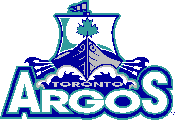
Obviously, football is a physical game, so it might be argued that the busiest guy on a team between certain matches is not the coach or the quarterback, but the doctor.
"I think the team doctor is essential in a contact sport," said Dr. Robert Jackson. "He has to be a player's doctor as well, and it takes a while to get that sort of confidence going."
When it comes to doctors in sports, Jackson is the Gordie Howe of his peers in terms of longevity. He spent 27 years as the main healer of injured Argonaut players, and before that spent six years in training beside Dr. John Palmer. Very few people in the team's history spent as much time with the Argos than Jackson, who was a world leader in orthopedics. His knowledge has taken him to the renowned Baylor University Medical Centre in Dallas, Texas, where he has been chief of orthopedics since 1991. He lives with his wife of 35 years, Marilyn, and has five children (Wade, Marni, Julia, Johannah and Gillian).
The last game Jackson was involved in with the Argos was the 1991 Grey Cup in Winnipeg, and unbelievable as it might seem, the game marked the first case of frostbite he had treated.
"It was a really cold day, and defensive back Reggie Pleasant played with his running shoes on," said Jackson, who earned his second Grey Cup ring that day. "His feet were killing him after the game, and I said: 'Reggie, you have frostbite'. It was the only time I'd seen it on a football player."
But he had seen an assortment of other injuries, as well as dramatic developments in surgery and equipment which has lenghtened careers and shortened the time on an injury list.
"The use of protective bracing has been very helpful," said Jackson, who along with trainer Fred Dunbar conducted a 12-year study comparing pre- and post-brace days, and found one-third less injuries. The development of arthroscopic surgery for knee injuries was also a big breakthrough, and Jackson remembers a funny story when it was first practised in the late '70's.
"I said to (injured defensive end) Wayne Smith, you're going to be fine and play next week," said Jackson. But Smith stayed out the entire pre-season, because Jackson told him he could go home, "and home was Halifax for Wayne."
However, for most players, it was tougher to keep them out of the lineup when injured, and only once did Jackson find himself in an uncompromising position with the Argos regarding a player's health. That was with star receiver Terry Greer in the early '80's, who was nursing a medial collateral ligament sprain and felt the pain go by after only 10 days.
"I said if he plays, then you can get another doctor," said Jackson, and the team relented. "They should realize you know a lot more than they do about when an athlete can come back."
While Jackson said most athletes were a pleasure to deal with, including the likes of Bobby Orr, O.J. Simpson and the Toronto Maple Leafs, who were among his clients, he admits they are changing now, especially in the U.S.
"They have contracts where they can go to whatever doctor they want," said Jackson. "Their agents have taken them away."
This page, and all contents, are Copyright © 1996 by Toronto Argonauts Football Club, Toronto, Canada.